General licences in general and our challenge to the NRW general licences in particular
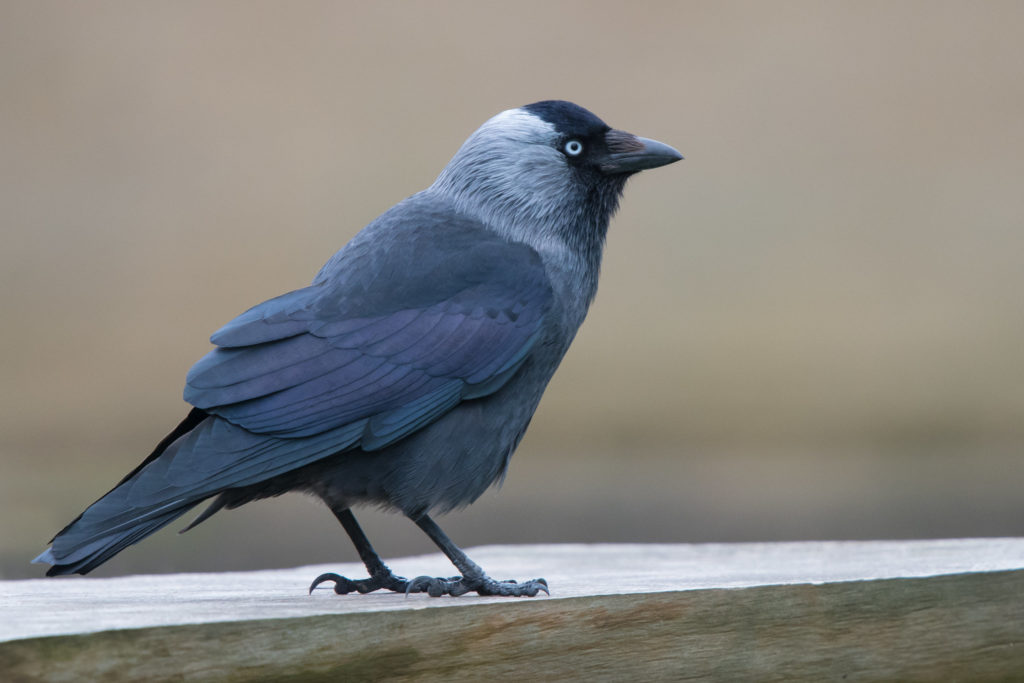
This blog is about the licensing system for killing birds in Wales which is licensed by Natural Resources Wales. There are similar in essence, but different in detail, licensing systems in England and Scotland. Wild Justice has been active on challenging general licences throughout our short existence. On Friday our challenge of the legality of the Welsh general licences was heard and the judge indicated that he would hand down his judgment in the first weeks of January so we know how he will be spending some of his lockdown Christmas.
This rather long blog sets out some of the background to general licences and how we ended up in court on Friday, what the judicial review process looks like, and what might come out of this challenge. We end with some relevant FAQs on this subject.
The protection of Wild Birds by the law
This is a good place to start because it is simple and everything else flows from it. All wild birds are protected by law – that’s the starting point (gamebirds are the main exception). Notice, the same is not true of mammals for example and Wild Justice will be doing some work on that. . Although all wild birds are protected by law the drafters of the laws recognised that there may be some good reasons why limited exceptions should be made to this general rule. They did not decide that all birds except corvids were protected by law but they decided that all birds were protected by law but exceptions can be made for particular purposes and under particular circumstances.
The purposes for which you can kill otherwise protected birds seem to us to be quite sensible. They are for such purposes as preventing serious damage to livestock or crops, to protect public safety and to conserve birds. And those are the types of purposes under which you can kill a Robin, a Carrion Crow or a Bar-tailed Godwit. But you’ll need a licence to carry out that killing because all wild birds are protected by law.
General licences and specific licences
There are two types of licence under which you can legally kill wild birds and they are specific licences and general licences. They both have to identify the purposes for which the bird killing is legal and the circumstances under which it is legal. Let’s start with specific licences.
If you believed that the Robins were causing serious damage to crops then you could apply for a specific licence to kill them. You’d contact your statutory nature conservation agency and probably have a phone chat with them first and then you’d have to fill in a form. And then you would either be issued with a licence or not. In the case of Robins purportedly causing damage to crops you would probably be asked things like: Are you sure they are Robins? What sort of damage are they doing? Is it serious damage? What non-lethal means have you tried before seeking a licence to kill? Are you really sure they are Robins? And then you might be issued with a licence that would specify how many Robins you could kill, in what period, in what geographical area, after carrying out what alternative methods. And you would have to send the licensing authority details of what you actually did after you’d done it. If you went ahead and killed Robins after being refused a licence you would clearly be committing an offence. If you broke the terms of the licence you would be committing an offence. The important thing though, is that if you had a good reason you would get a licence. But your case would have been scrutinised and the licensing authority would have decided that this particular, specific exception from ‘All wild birds are protected by law’ was justified. We know that such a system is not likely to be perfect, but that depends on the ability of the licensing authority to do its job properly. How about general licences?
General licences to kill birds exist in all four UK nations. What is a general licence? It’s a means of setting out the purposes and circumstances under which killing otherwise protected birds is legal. Instead of arguing your specific case under purposes and circumstances in order to get a licence to kill, those things are set out in a general licence which these days is published on the internet (here are some examples; England, Wales, Scotland).
We don’t have a pest list, but the general licences are as close to such a thing as we come in the UK. The species that have been killed under general licences over the past decades are generally corvids (such as Carrion Crow, Magpie, and Rook) alongside Wood Pigeon, some gulls and a range of non-native species.
Why Wild Justice cares about general licences
The fact that all wild birds are protected by law is important to us. It is a cornerstone of bird conservation in the UK. And yet millions of birds are estimated by shooting organisations to be killed under the terms of the general licences. These estimates come from asking people what they do and we aren’t confident that the right people are asked nor that they are all telling the truth. By their very nature general licences are difficult to monitor because there is no list of people who claim to be operating under their terms and no requirement to gather centralised information on the number of birds killed – so there is a lot of guesswork involved.
Across the UK there are certainly millions of birds killed under general licences and this has been going on for decades.
Species have come and gone from the lists over time. Getting the way these licences work fit for purpose is an important strategic goal. We wouldn’t want to see future general licences being flawed in detail and having more inappropriate species added to them.
Wild Justice is primarily a conservation organisation and we have been primarily concerned with the general licences in all UK nations that purport to be for the purpose of nature conservation. Until recently it has been legal to kill Rooks, for example, under the conservation licence to protect wild birds. This is simply ridiculous and our actions have led to Rooks being removed from these licences across the UK.
We believe that the conservation licences across the UK are badly flawed and are simply a cover for shooting interests, not conservation interests, to carry out casual killing of birds. The licences add up to casual licensing of casual killing of birds – and remember, all wild birds are protected by law.
Let us illustrate the point with respect to the Jay – a beautiful woodland bird that feeds on a variety of things including, yes, some eggs and chicks of other woodland birds. Jay is currently listed on the conservation general licences in England, Wales and Scotland. Who kills Jays for conservation purposes under these general licences? We really don’t know! It isn’t the RSPB who kills no Jays, Magpies or Jackdaws for conservation purposes across its 200 nature reserves in the UK. And it isn’t statutory land-managing organisations in England, Scotland or Wales that have a conservation remit – across our public forests Jays are not killed in anything other than tiny numbers. Note that this includes by NRW itself – NRW is the licensing authority in Wales but is also a land manager and it does not kill Jays on the land it manages, nor does it allow others to do so, despite being the author of the very licence!
Jays are only listed on general licences now for conservation purposes and yet conservation organisations do not kill Jays. So who does? We have no idea except gamekeepers seem very keen to kill Jays. GWCT tell us that 10,000+ Jays a year are killed for conservation purposes in the UK. By whom? Why? How many of these Jays would still be killed if their killers needed a specific licence before they could kill Jays?
A short history of Wild Justice’s challenges of general licences
Wild Justice’s first legal challenge was of Natural England’s general licences in spring 2019. Natural England agreed the licences were unlawful and clumsily withdrew them at a few days notice causing alarm and despondency amongst shooters and some farmers. Natural England then embarked on writing replacement general licences and these looked better to us, but not good enough, and so Wild Justice started a new legal challenge of aspects of those licences. DEFRA caved in, as they so often do, to ill-informed lobbying and took over the licensing job from Natural England. DEFRA held a very brief consultation and then issued new flawed licences but committed to carry out a further review and recently they have issued new licences, still flawed in our view, but better in some respects. We are still examing those licences since their final shape has only been made clear in the last few days.
In Wales, NRW issued new improved licences for 2020 but those licences were still, in our view, unlawful because of lack of clarity over circumstances under which they could be used, and so we started a legal challenge of those licences in 2020 (see below) and that’s how we ended up in court on Friday.
What Wild Justice has achieved so far
Since we challenged the Natural England general licences in February 2019 there have been significant and welcome changes to the general licences in place across England, Scotland and Wales – although not enough! Our action has made a huge difference. Here are some changes:
- the species that can be killed have been reduced in number
- the species that can be killed for alleged conservation purposes have been reduced
- the species for which conservation licences can be used for their conservation have been defined and listed for the first time – the lists are pretty bizarre but the task now is to make them better
- in Wales (well done Wales) the circumstances under which the killing of some species to conserve certain other species can be lawful is only to protect eggs and chicks which suggests that it is only valid when those species have eggs/chicks which severly limits the time of year
- the places the licences apply now exclude SSSIs etc where special permission is needed
- the killing of species to protect gamebirds has been limited
- the wording has improved (but not enough)
We believe this is the start and not the end of progress on this important issue.
What happens in a judicial review before you get to court?
To get to court on Friday we had to go through a variety of stages, all time-limited. We sent a formal Pre-action Protocol letter to NRW on 3 February 2020. Here is the start of that 10-page letter (and note that correspondence had started months earlier);
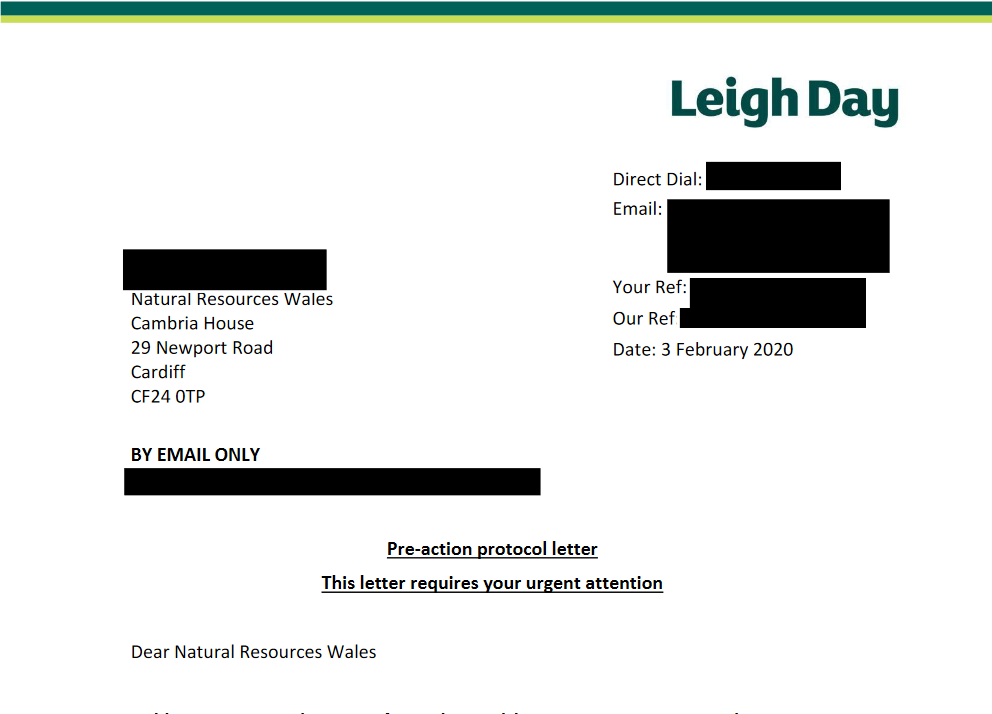
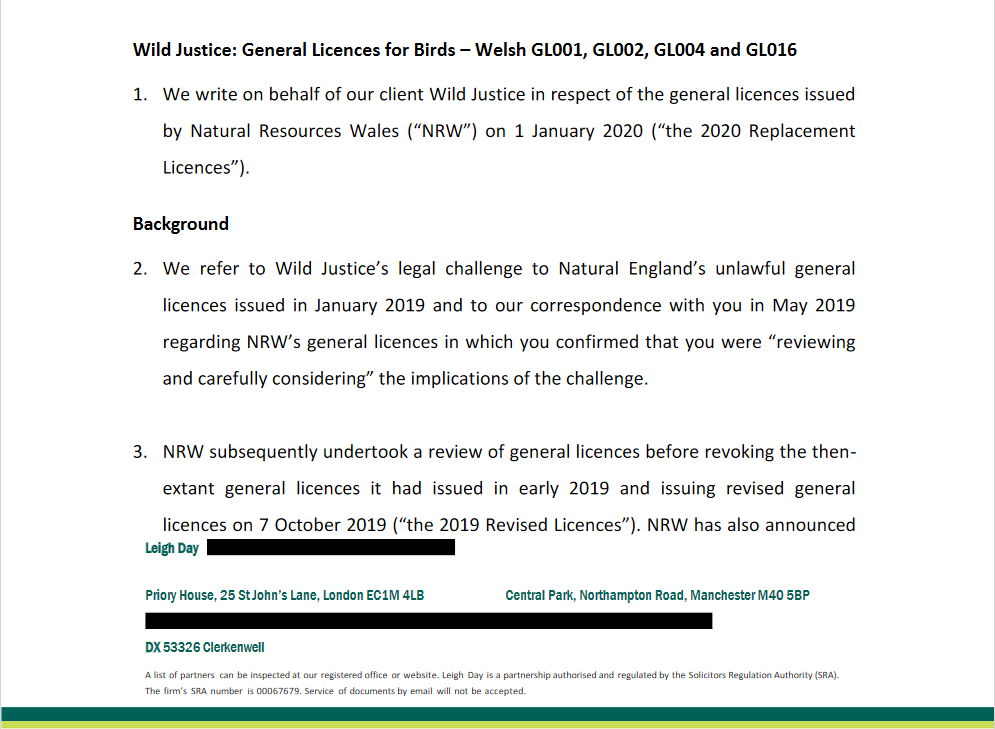
…some bits from the middle:
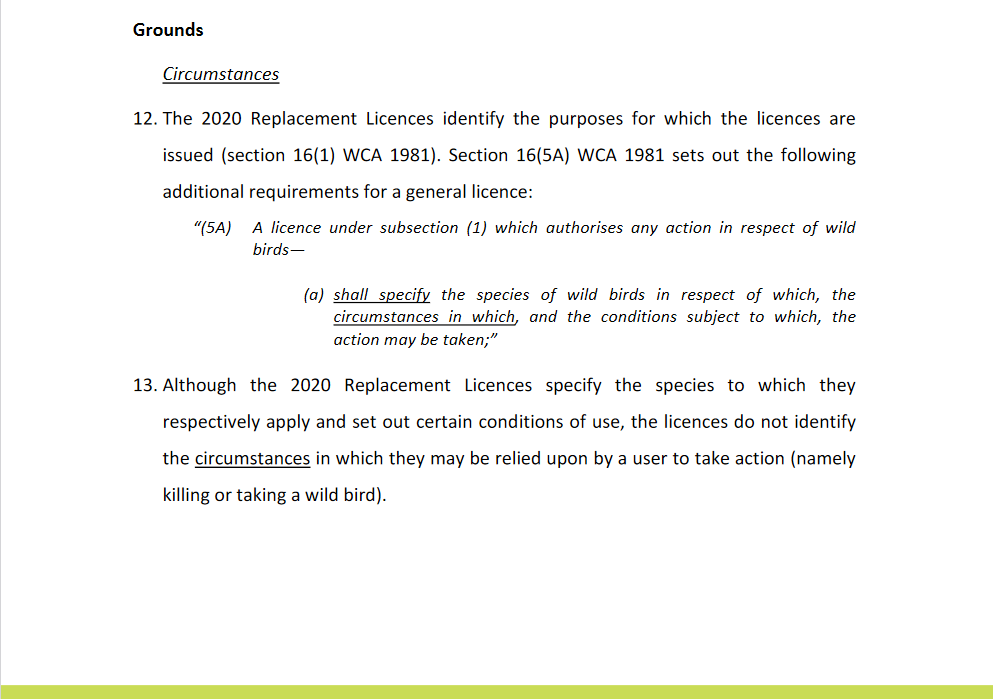
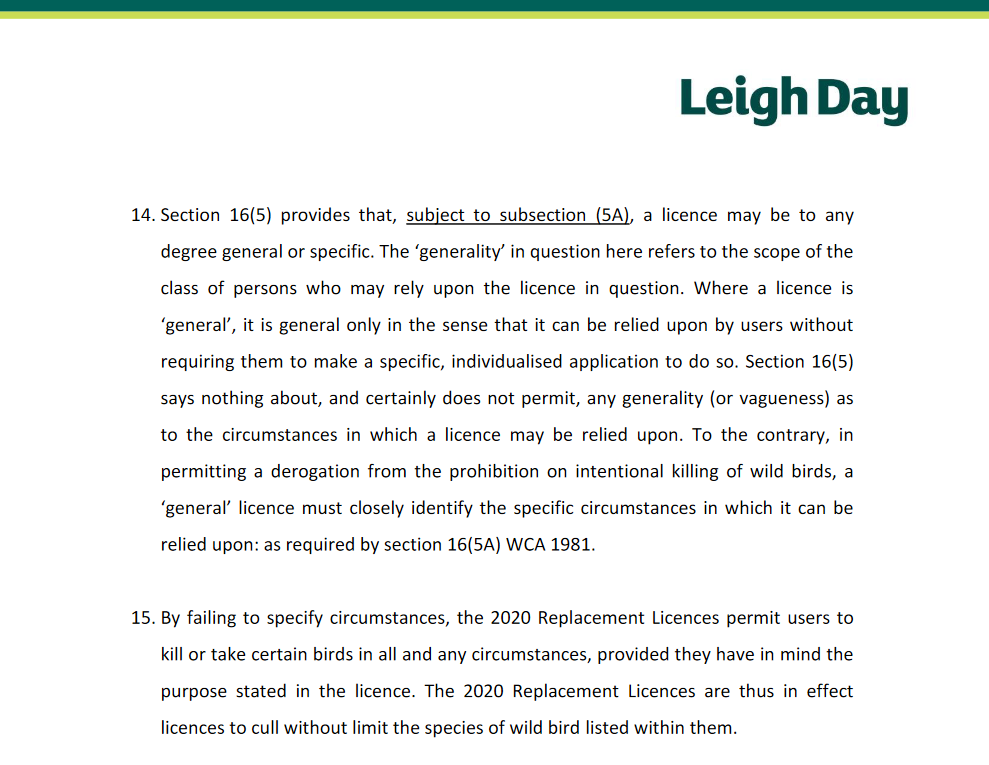
…. and the end:
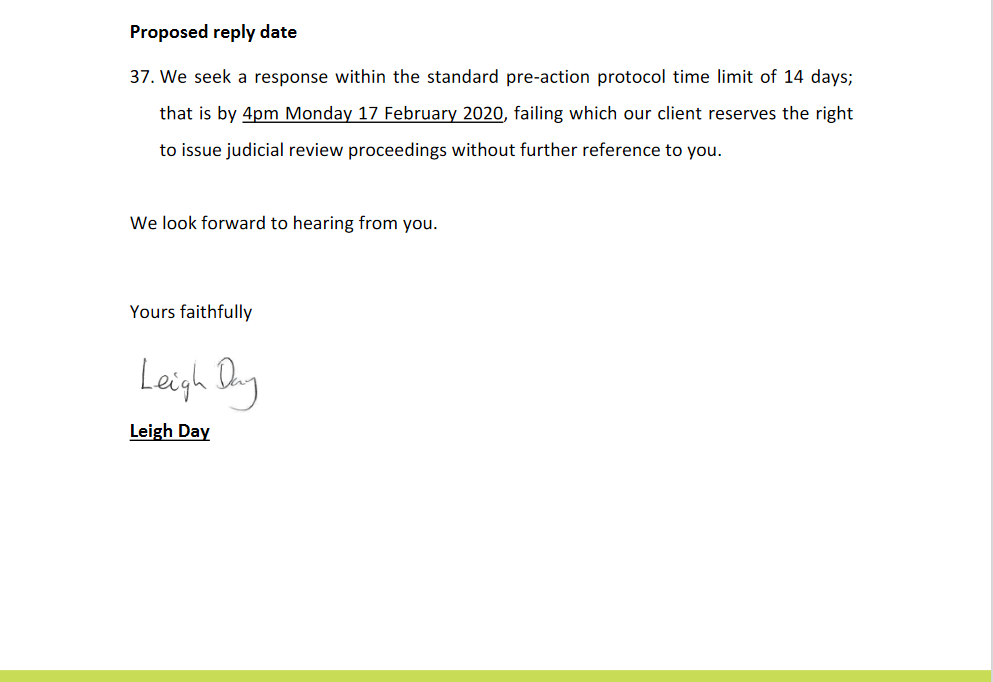
NRW asked for more time and replied on 2 March (thus causing delay).
Wild Justice took the next step by filing papers with the court on 17 March; these included a Witness Statement from Wild Justice, outline grounds for the case, a financial statement of means and a permission bundle!
NRW then had to file similar papers with the court and on 3 August we heard that a judge had given us permission for judicial review – in front of a different judge, and that’s what happened on Friday. Ahead of Friday both sides (we are the Claimant, NRW the Defendant) have to provide more paperwork including the skeleton legal arguments on which they will rely.
It’s a process with bouts of high activity and long periods of waiting to see what is going to happen. COVID-19 won’t have speeded things up, nor will BASC, DEFRA and the NFUW applying to be interested parties. BASC were originally turned down as interested parties but got through in the end – we feel their intervention was rather more helpful to our case than NRW’s case as it happened (although we expect BASC may disagree)..
What happened in court on Friday
The hearing took place online – so we all had the joy of logging in and then watching a screen for ages. Our barrister, David Wolfe QC opened proceedings at 10:30 by setting out the general legal framework and what our particular legal gripes were. This took around two hours. Then the Defendant’s barrister had a good chunk of time (interrupted by an hour off for lunch) and followed by shorter speeches by two of the three interested parties’ barristers, first the government’s top lawyer Sir James Eadie (which shows that DEFRA is paying close attention to the implications of this challenge for their own licences) and then the BASC barrister. And then our guy, David Wolfe, gets a slot to say why Defendants and interested parties have got it all wrong. The hearing ended on time just before 4:30.
The judge, His Honour Judge Jarman, asked a few questions but basically listened and took notes. The questions he asked were potentially useful to our case but since we cannot read his mind we’d better not speculate.
Basically what we asked for was that the judge declare the 2020 NRW general licences unlawful because they do not specify the circumstances under which their use would be lawful. You may notice that the 2020 licences have less than a fortnight to run but if they are called unlawful then that has implications for all future licences (and potentially knock-on implications for general licences across the UK, which is why, we imagine, Sir James Eadie was present throughout).
What happens next?
The judge considers the arguments, consults the legal tomes, decides what is right and writes his judgment. The judge said he would be able to do that in the first weeks of January which is very good of him.
What might he decide? We have a strong case, so the judge might, in different words, decide that Wild Justice has NRW bang to rights. That would be great! We’re not banking on that but it is entirely possible.
He might decide that Wild Justice has got it all wrong and NRW has got it all right. We’re hoping this doesn’t happen but most judicial reviews fail so it is a possibility. That would be a shame for us but at least we have tried, and we have shone a light on the whole murky process of general licences – particularly those allegedly for conservation purposes.
Or it might be somewhere in between with each side gaining something, either ‘the licences are unlawful but they aren’t far off being lawful’ or ‘The licences are lawful but they aren’t far off being unlawful, and should be redrafted either now or next time around’.
What happens next 2?
When the judge delivers his judgment we and other parties will have to read it, discuss its implications and decide what to do next. There is the possibility of appealing the judgment if it goes against us. but let’s look at the rosier side of things; success, even limited success, in our challenge has implications for future general licences in Wales and England and Scotland. Wild Justice will be keen to make futher progress in making these licences fit for purpose. Remember, all wild birds are protected by law except under very limited circumstances.
Sorry, that’s a long and somewhat technical blog but we hope it explains many of the issues and the work that goes into taking such a legal challenge. also, we are sometimes asked questions about the process and this blog sets out some answers to regular questions below.
FAQ
Q1: Why is Wild Justice trying to end the killing of pest species?
A1: We’re not (although we don’t like the term pest species) we are trying to make the licensing system both lawful and reasonable. We accept that there are valid reasons for killing bird species but we believe that there is a lot, an awful lot, of casual killing of birds which goes on. And notice that the agencies have removed several species that should never have been on the general licences in the first place from the conservation licences so our action has made them think again.
And, of course, we haven’t challenged the specific licensing system which is another means of licensing bird killing under the law.
Q2: Why does Wild Justice want to see general licences scrapped.
A2: We’ve never asked for them to be scrapped. It’s up to the agencies to come up with general licences that are fit for purpose and lawful. They seem to be struggling, we agree.
Q3: Nobody is going to wipe out Carrion Crows by shooting and trapping them. This isn’t a conservation issue.
A3: General licences allow unregulated unlimited killing so how do you know what could happen in future? Would you say the same about Herring Gulls and Lesser Black-backed Gulls which have been removed from the general licences after our challenge? In those cases there was good evidence that unlimited culling under the general licences did cause population declines. And in any case, the law doesn’t say anything about that – it says all wild birds are protected by law. You could kill Robins, Blackbirds and Avocets, up to a point, without reducing their populations but the law doesn’t allow that either.
Q4: Why don’t you do anything in Scotland on this issue?
A4: As you probably know, there is a separate legal system in Scotland although the laws are basically similar. We know that Nature Scotland and the Scottish government are watching events south of the border with interest and, we believe, with some trepidation. we are prepared to take legal action in Scotland too – but we’d have to find a new bunch of lawyers and barristers with whom to work whereas our legal team, who can operate in England and Wales, are now right up to speed with these issues. Watch this space.
Q5: Everyone was perfectly happy with the general licences until you lot came along and stirred everything up. Everything was fine as it was.
A5: Ha! Ha! We’re often told that everyone knew that the general licences weren’t fit for purpose but that the agencies and the major wildlife NGOs were to scared to change or challenge them. We prefer that version. The scale of change already brought in shows that you are wrong, and we believe there is more to come.
Q6: You’re ripping off the public so that yourselves and a bunch of lawyers can get rich on the proceeds.
A6: That’s very rude of you and completely untrue. Wild Justice is a not-for-profit company and none of its members, the three of us, are paid or get any benefit from the company. In fact, we get death threats and abuse from some quarters and we give freely thousands of hours of our time and experience in bringing these legal challenges to court to make a difference for wildlife.
Our lawyers are brilliant and work long hours and offer us heavily discounted fees. You can see how much our legal challenges cost from our crowdfunders. We have access to the finest legal advice and some brilliant legal minds and pay moderate fees (Shhh! Don’t tell them!).
We don’t have the resources ourselves as individuals to fund such challenges. Nor do lots of other people who support them, but by all chipping in to a crowdfunder together we can mount such challenges and make a difference. Arguably some of the larger wildlife NGOs could have been doing what we are doing, and arguably should have been, but they weren’t, so we stepped in and we have considerable public support for which we are very grateful.
Q7: You’re just anti-shooting aren’t you?
A7: Yawn! No! We are, remember, challenging the shooting of Badgers under Natural England licences – Badger shooting isn’t a fieldsport as far as we are aware. We’re still waiting for an appeal date on that. And if you subscribe to our newsletter – click here – you’ll know something of our plans for the future. Use of pesticides is not a shooting issue is it? The next issue of our newletter goes out tomorrow – you’ll learn more about what we do in that.
